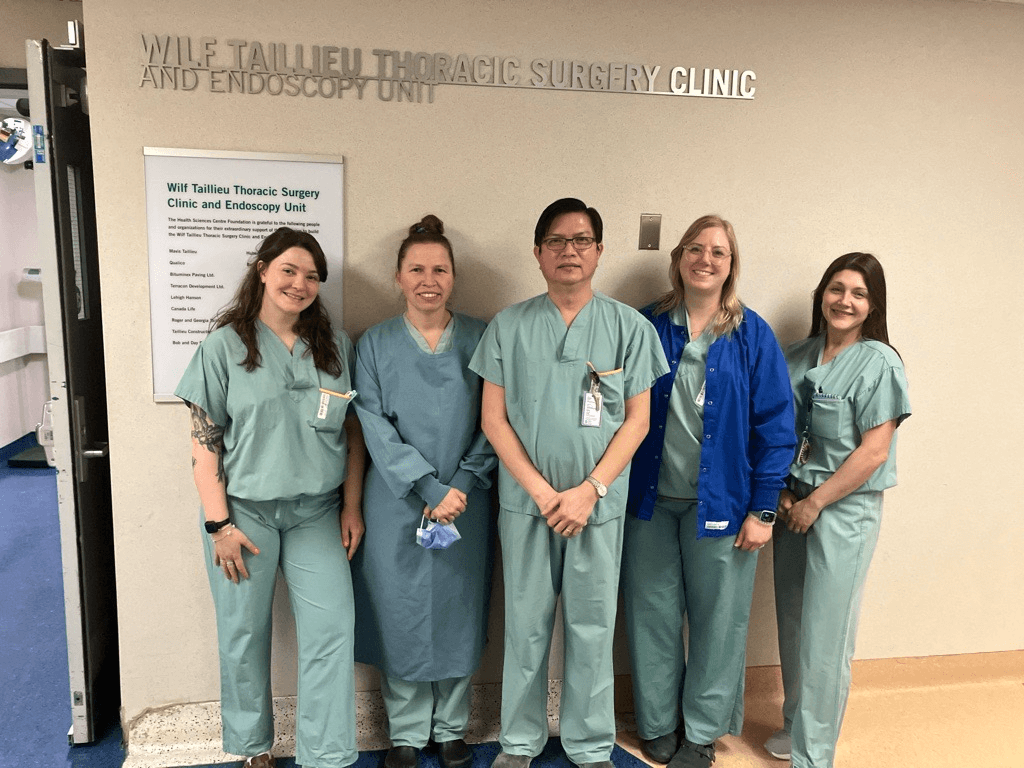Operating Room Assistant
Are you a trained Health Care Aide with at least three years of recent experience working in an acute care environment? Are you looking to expand your skills and contribute to safe care for patients in an essential care environment?
Consider training as an Operating Room Assistant.
A comprehensive 12-week paid training program will prepare you for a full-time role working alongside surgical team members, using your skills to contribute to the delivery of safe and effective care for Manitoba patients undergoing a surgery or procedure.
Surgical and procedural teams across the province are supporting the delivery of care for thousands of Manitobans. The members of these care teams are highly-skilled and extremely passionate about the care they provide.
During a surgery or procedure, OR Assistants will provide support in the management of sterile instrumentation and the sterile field; assist with both the preparation of surgical instruments before a procedure; and support the post-procedure transport of instruments to the decontamination area. They will assist with the safe positioning and transfer of patients, participate in post-procedure cleaning of the operative or procedure room, and handle instruments, supplies and equipment necessary during the surgical procedure.
In this role, you will work alongside experienced colleagues, making already strong teams even stronger, while allowing more Manitobans to receive the help they need.
If you are a quick learner and thrive in a dynamic, challenging and rewarding environment, apply today!
Training and Orientation
Through virtual education and clinical orientation, you will develop the skills to succeed. Graduates will also complete on the job orientation to the role to ensure they are set up for success.
Under the supervision of the Clinical Manager, OR Assistants will work with regulated health-care team members to support safe and effective delivery of surgical/procedural care, ensuring that the operating/procedural room environment is safe, that equipment functions properly, and that the procedure is conducted under conditions that maximize patient safety.
OR Assistant duties may include both clinical and non-clinical functions:
Clinical:
- Assist with creation and maintenance of the sterile field;
- Assemble, set up and disassemble instrumentation associated with procedures and/or surgeries;
- Clean and prepare instruments for processing and transport to decontamination areas;
- Assist with post-procedure cleaning of the operative or procedure room;
- Assist with safe positioning and transfer of patients pre and post procedure;
- Participate in ongoing educational and competency verification activities applicable to role;
- Under the direction of the surgeon/endoscopist/proceduralist: handle instruments, supplies, and equipment necessary during the procedure/surgery;
- Under the direction of the surgeon/endoscopist/proceduralist: anticipate the needs of the health-care team related to the procedure being performed and intraoperative/procedural requirements;
- Under the direction of the surgeon/endoscopist/proceduralist: ensure quality patient care during the surgery/procedure with sustaining vigilance and attentiveness to maintain the sterile field;
- Identification, communication and resolution of malfunctioning or broken equipment; instrumentation and/or supplies;
- Participate in the Surgical Safety Checklist phases of the operative procedure;
- Participate in all required surgical counts as per policy; and
- Participate in emergency codes as required/directed.
Non-Clinical:
- Follow organizational policies and procedures and best practice standards to ensure safe care for patients and optimal team functioning;
- Complete documentation if required in accordance with documentation policies;
- Assist with obtaining, cleaning and maintaining equipment, as required;
- Restock supplies as assigned; and
- Complete appropriate process and associated documentation to address equipment repairs.
OR Assistants must successfully complete a 12-week micro-credential certification program consisting of 10 weeks of online learning (five days per week), two in-person practice labs, and a two-week clinical practicum.
Training is provided at no cost to the participant with a valid two-year return of service agreement.
Eligibility
Eligible participants must meet the following requirements:
- a minimum of a grade 12 education;
- completed a recognized, comprehensive Health Care Aide course;
- strong ability to express ideas and thoughts in English, both verbally and in written formats;
- at least three years of recent experience working in an acute care setting, with OR/surgical experience preferred.
Careers
Information on future intakes coming soon! Check back regularly.
Questions & Answers
Read our FAQs, or see below for answers to common questions.
What is an Operating Room Assistant?
During a surgery or procedure, OR Assistants will provide support in the management of sterile instrumentation and the sterile field; assist with both the preparation of surgical instruments before a procedure; and support the post-procedure transport of instruments to the decontamination area. They will assist with the safe positioning and transfer of patients, participate in post-procedure cleaning of the operative or procedure room, and handle instruments, supplies and equipment necessary during the surgical procedure.
In this role, you will work alongside experienced colleagues, making already strong teams even stronger, while allowing more Manitobans to receive the help they need.
Are OR Assistants new to Manitoba?
Yes. Manitoba’s first group of OR Assistants have completed the Mohawk Micro Credential Certification Program and have been continuing orientation to their respective environments.
Where will OR Assistants work?
OR Assistant opportunities are available in operating rooms, procedural areas and clinical areas all across Manitoba’s health system.
Who is eligible?
In order to train as an OR Assistant, eligible participants must have:
- a minimum of a grade 12 education;
- completed a recognized, comprehensive Health Care Aide course;
- strong ability to express ideas and thoughts in English, both verbally and in written formats;
- at least three years of recent experience working in an acute care setting, with OR/surgical experience preferred.
How do I apply for the training?
If you meet the criteria, select the facility/site you are interested in and apply to available OR Assistant job postings.
If you are a successful candidate, you will be enrolled in the required micro-credential program. Upon successful completion, you will begin work in a participating facility.
How many candidates are you accepting for the training?
Limited space is available for these sessions, and participants must be available to take the course at the time it is offered. Only those who successfully complete the course will be able to start their OR Assistant position.
What is involved in the training and orientation?
Manitoba students will participate in – and complete – the OR Micro Credential Program offered by Mohawk College. This is a 12-week course, including 10 weeks of virtual education, with scheduled class activities five days per week (20 hours per week).
Two in-person lab sessions take place during the 10-week education period, scheduled on the Fridays and Saturdays of week five and week 10. They are eight hours long. That means on week five individuals will work six days in a row, and on week 10 individuals will work six days in a row again.
A two week in-person clinical practicum is also required and will be delivered at participating Manitoba health-care facilities. Students must successfully complete all modules of the virtual training before being approved for participating in the clinical practicum. A passing grade for all courses within the program is 60 per cent. Graduates will also complete on-the-job orientation to the role to ensure they are set up for success.
Participation throughout the 12-week training is mandatory.
How much does it cost?
Your training is offered at no cost, with an agreed upon return of service agreement.
What is a return of service agreement?
A return of service agreement is a contract between an employer and an employee, guaranteeing a period of service following the completion of employer-paid training. OR Assistants will be required to complete the terms of a two-year contract following completion of their training.
If an individual leaves their position before the two-year agreement is complete, the individual will have to pay back money to the employer depending on when they leave. The amount of money to be repaid will be determined by Human Resources.
Are OR Assistants members of a union?
Yes. OR Assistants will be members of their sites associated union including CUPE and MGEU.



